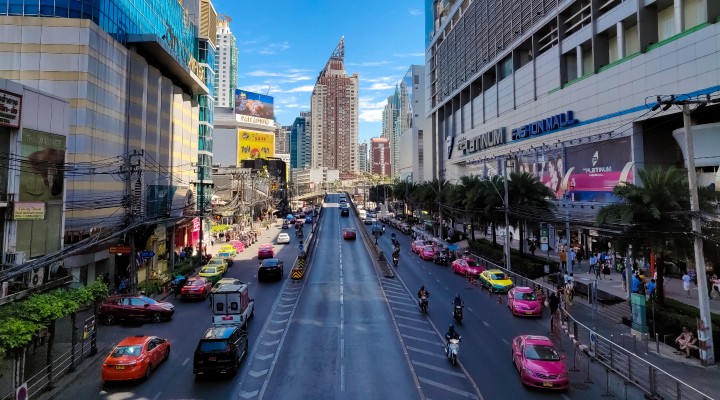In the heart of Bangkok, Platinum Fashion Mall is alive again, much to the delight of the city’s legion of fashion shoppers, mom-and-pop retailers and, without doubt, tourist hordes that will be returning in the second quarter as the country opens up. It’s been a miserable two years for this veritable beehive of a vertical mall, despite its huge popularity and the uniqueness of its market position. Platinum sells to both consumers and retailers, so it is often referred to as a ‘wholesale m
e mall’. Kuala Lumpur Wholesale Mall in the Malaysian capital is another good example, but overall there are not too many of these beasts around and even fewer that come close to Platinum’s formidable quality and size. This is no flea market; it’s a genuine modern shopping centre, with a food court, parking and a squeaky clean interior.
In 2019 – the last ‘normal year of trading’ – the mall’s 23,656sqm of leasable area were 96 per cent occupied. By the end of 2021, occupancy was down to 60 per cent. Last year alone, the mall was closed by government edict for 51 days, and even when it was open, foot traffic was terrible.
Platinum’s owner, The Platinum Group, did its best to keep the wheels from falling off but it was a tough job and financially damaging. In the fourth quarter, when the lockdown was eased and Bangkok’s vaunted malls returned to some degree of normality, the owners kept hand-holding tenants with rent relief and service discounts. This caused rental revenues to drop sharply but there wasn’t much alternative for getting struggling tenants over the line. Those that hadn’t fallen over already were on the brink. Many of the more than 2,500 shops had to close, some going out of business and some making desperate attempts to sub-lease, signified by the number of shuttered units with contact phone numbers and names scribbled hopefully on the metal roller doors.
Now, those doors are up again and the customer crush for which Platinum was famous before March 2020 is back. There are still some vacant shops but this is a far cry from 2020-21.
Like a street bazaar
The property is divided into three zones. Zones A and B are both seven levels of retail, while Zone C is the Novotel Hotel perched on top. The retail floors are sliced and diced into myriad small retail boutiques stuffed with clothes, footwear, jewellery, and leather goods. The walkways between the rows of shops are narrow, creating a sense of strolling through an air-conditioned street bazaar. Indeed, the impact of Covid-19 on Platinum Mall may have been greater than on other malls for this reason alone: the closeness of other people made it a disconcerting environment for a lot of shoppers.
But it is this bazaar quality and the fact that Platinum’s tenants are selling high-quality retail goods at wholesale prices that makes it both famous and a wonderful complement to the other retail in the downtown area. Just across the street from Platinum is the Pratunam Market, one of Bangkok’s most popular street markets. And a lazy and slightly stinky canal that winds its way along the back of the mall separates Platinum from another of Bangkok’s famous shopping destinations: the massive Central World.
Directly opposite Central World is another of The Platinum Group’s retail projects, called The Market Bangkok. Bigger than Platinum Mall, The Market Bangkok opened in March 2019 and was 75 per cent occupied and just getting traction going into 2020. By the end of 2021, it was only 39 per cent occupied and it, too, has had to claw its way back to life.
Increased competition ahead
This freefall in retail occupancy caused The Platinum Group a lot of financial pain. It earned revenues from operations of 2.3 billion THB in 2019. About 70 per cent of company revenues emanated from the retail business. But then two years of lockdowns and the closure of Thailand’s international border to tourists took their toll, not just on the company’s retail assets but on its Novotel Hotel as well. Operating revenue was slashed to a puny 403 million THB ($16.7 million) in 2021 and the company swung from a profit of 1.188 billion THB to a loss of 145 million THB.
Despite the nascent recovery picking up steam in the second quarter, The Platinum Group concedes that with the amount of new retail space due for completion over the next few years, the Bangkok market is likely to be oversupplied, particularly with e-commerce growing and government stimulus being throttled back. It therefore needs to keep updating existing space and build more flexibility into its leases to nurse its tenants along. JLL states that an additional 68,000sqm of leasable retail space will be released to the Bangkok market in the first half of 2022 alone.
Going forward, The Platinum Group plans to invest in the extension of The Market Bangkok, which is being developed over three phases, the second of which will consist of a 3-star hotel and offices.
Platinum Fashion Mall’s unique niche in the market and the fact that it has such a diverse set of customer groups – local retailers and consumers, domestic and foreign tourists – gives it the opportunity to focus on fashion to a degree that other malls cannot. The big expansion in retail in recent years has been concentrated in health and beauty, food and beverage, and services, with landlords having to pull back on clothing and accessories as sales of these have shifted increasingly online and global fashion players have downsized their store fleets, a process that is ongoing.
Still, despite its niche, The Platinum Group is smarting from the beating up it took from the pandemic. It is hedging its bets and in 2021 it unveiled its new digital initiative, Platinum Online Marketplace. As nice as it is rubbing shoulders with the masses, the company understands that online commerce can no longer be ignored.

